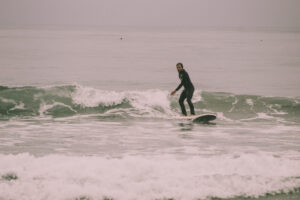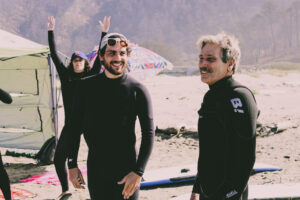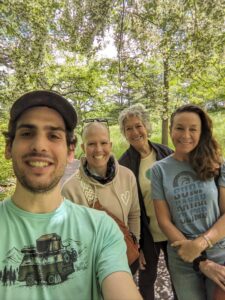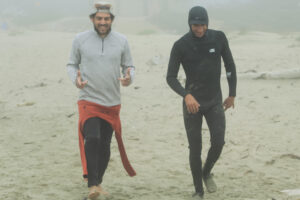Phone: 303.945.2490 Fax: 866.592.6911 Email: [email protected]
621 Kalamath St. Ste 175, Denver, CO 80204
JOIN US FOR A 2025 HEALING ADVENTURE!
The link between mental health issues, social isolation and MS has been the subject of several studies over the last decade, and Adam “Recliner” Stein says he knows firsthand what that’s about.
“I think that since COVID, we’ve all come to realize that we do need other people and those connections,” Recliner says. “It’s just not healthy to be alone all the time, in your own head, where it’s easy to imagine that you’re the only one experiencing these hard things. And it’s even worse if you have a disease that your friends and family may have a tough time understanding, even though isolating was so critical for the immunocompromised.”
Diagnosed with MS at the age of 26 nearly six years ago, Recliner says it took him a while to realize that he had to prioritize his mental well-being alongside his physical health. Now, though, he considers spending time with others who are dealing with a similar diagnosis to be just as important as exercising and following a nutritious diet.
“I’d never met anyone with MS before I was diagnosed, and so I was just reading stuff online and trying to wrap my head around what was happening to me,” he says. “And because I was diagnosed a year before COVID started, that meant that I really did have to just isolate and try to work through it without knowing anyone who had a similar diagnosis — although I was lucky to have an incredibly close and supportive family and group of friends from the beginning.”

Soon after the pandemic ended, though, he found First Descents. “That was so lucky, that someone close to me came across this info about these trips that I could take and also meet other people my age who have MS, too,” he says.
After his surfing program with FD in Santa Cruz in 2022, Recliner decided to try a few Community Adventures — locally led excursions with FD community members in locales across the country — and not only started leading them himself, but this year, he became one of the first Alumni Ambassadors, as part of a First Descents initiative to bring the healing power of adventure in a group setting to more who need it.
“I saw the value in this from the first Community Adventure I did, after seeing these connections that people had made and so fast,” he says. “So I knew right away that I wanted to provide that platform and opportunity for other people. It has just been so crazy rewarding to get people out on these adventures and see what it brings to their lives so quickly, and then to know that I had helped facilitate that.”
But he admits that it took a while to get to this space of reaching out rather than withdrawing.
“Looking back, I think I probably had MS for maybe four to five years before I got diagnosed,” Recliner shares. “I don’t know for sure, but about ten years ago, I definitely started noticing that I felt different, just kind of not like my usual self.”
At the time, though, he was finishing a degree in electrical engineering at the University of Delaware, and had started his first job. “That job was kind of intense, really stressful, and so I kept thinking that I was just feeling stress and burnout,” he says. “In hindsight, though, I was feeling these weird tingling things, and I had brain fog and fatigue. I also wasn’t sleeping great, which didn’t help.”
Meanwhile, he was starting to realize that he didn’t love electrical engineering. “I had always wanted to be in a more creative, entrepreneurial role,” he says. “So within two years of my working at this utility, I saved up a bunch of money, and then I just left. I knew I wanted to do something in the community sustainability realm, and so I went to Spain and lived in an off-grid eco village for a few months.”

Staying for free on a farm, with all of his food coming right out of the ground, and plenty of fresh air and time spent working hard outdoors, he started to feel a little better. “I definitely was sad to leave, especially because the community was just awesome,” he says. “All of these volunteers came from all over the world, and everyone works together and eats together, and so it was just a way of living that I’d never been exposed to before, and I really started to understand what people mean when they say ‘community.’”
“I think we kind of undervalue community sometimes, but then I’ve come to realize that it really is maybe one the most important components of our lives,” he admits.
When he returned to the States, Recliner — who was originally from Delaware — traveled around the country a bit, and then decided to settle in Philadelphia, where he found an appealing opportunity to work with a local solar company, Solar States: “It was very mission-driven, and so I was really excited to find it, because I wanted to be somewhere that people were focused on a goal that was beneficial to people.”
The first year was a blur, with Recliner racing around from house to house and even to commercial properties, surveying them for solar and then racing back to the office to design the systems. He also found himself in a new relationship, and everything seemed to be going well despite the fact that he still felt unusually tired and out of sorts.
And then one day he woke up with blurry vision. At first he tried to ignore it, but after a month passed and it hadn’t gone away, he went to see an eye doctor, who identified a swollen optic nerve. “At first, the eye doc was like, ‘This could be a number of different things,’ and MS was on the list, but it was just one of the things,” he says.
“But then the eye doc started to think that MS might be more likely, and so I had to go to a primary care doc to get a referral for a neurologist. I feel pretty lucky that I could go to the University of Pennsylvania, which is a pretty renowned facility, and there I basically saw two neurologists, and they did an MRI. And once they had those two symptoms, the blurry vision and an MRI that showed lesions, well, they finally made that MS diagnosis.”
Because he’d been feeling “off” for so many years, Recliner says the diagnosis actually gave him a partial sense of relief. “It’s just so weird, all that time my vitals were fine, I’d been to see doctors, nothing seemed wrong,” he says. “But then, just before my diagnosis, I had started seeing a therapist, because I just couldn’t shake this sense that something wasn’t right with me, but I couldn’t figure out what it was. So now, with the diagnosis, I at least had that clarity.”

After the initial shock, Recliner says he then started to think about how he was going to move forward. “For a few months, I was just trying to make sense of everything,” he says. The first round of medications didn’t help, but then his doctor started him on six-month infusions of Ocrevus, which he’s been doing now for four years, but he couldn’t shake the feeling that he could be doing more to feel as well as possible.
“So then I went into full research mode, and so did my support system. My mom discovered an organization called Overcoming MS through their podcast, and they have a book they published about lifestyle, diet, exercise, mindfulness, sunlight — all the core pillars of health for people with MS. And I started listening to the podcast, too, and that’s when I started to make changes.”
Recliner had always leaned toward healthy habits, but now he decided to take it to the next level, and started looking for more holistic approaches to managing his symptoms. “I went dairy-free after reading this book, as a personal choice, and I went, well, somewhat meat-free,” he explains. “What was really amazing was that my whole family joined in with the diets and lifestyle.”
He realized he needed to start making exercise a priority, too, and so when he encountered First Descents, he knew it was what he had been looking for. “I love being outside, I love nature, and I’ve done some minor adventuring around, but I was never what you’d call super adventurous,” he says. “As soon as I saw that First Descents not only gets you out on these great experiences, but also that there is this intense focus on nutrition and community, I applied right away.”
He appreciated that the staff and guides worked so hard to make everyone feel comfortable, adding that the thing that struck him most was “just like the thoughtfulness of how the program went, like how everyone greeted us when we got there,” he explains. “And even though no one knew each other and we were all sort of awkward, by the time we’d had a couple of campfires, it was just so amazing to see the transformation over the retreat. Every person really seemed to open up by the end of it. It really is powerful.”
Recliner loved the infamous nickname process, as well. “Mogul, he’s a pretty beloved staff member, and he helped bring ‘Recliner’ out of me,” he shares. “It actually goes back to high school; my last name is Stein, and I was relaxing on this recliner one day, and out of nowhere a friend started calling me ‘Steiner the Recliner.’ It kind of stuck, and I used it for my Instagram handle. When Mogul picked me up at the airport, he asked if I had any nicknames, and at first I couldn’t think of any, but then I told him the handle, and he said, ‘Why don’t we just shorten it?’”
After his program, Recliner was looking to stay connected to the FD community. “The hard thing was, most of the people on my program weren’t from the East Coast, and so I came back to having no one who understood my life again,” he explains. “We all kind of tried to stay in touch, but there was the distance thing keeping us from being able to hang out. And so when I saw this rock climbing event in Fishtown right near my house in the FD newsletter, I was like, are you serious? I jumped on it right away.”

When Recliner found out that he could start leading his own Community Adventures, he was hooked. “I love the adventure component, but I also love that we can go have lunch after and just chat,” he says.
Since leading several hikes around Philadelphia, he’s looking to find more young adults with an MS diagnosis to join him. “I’m feeling better all-around, and although I have a few mild symptoms here and there, I’d say it’s controlled for me now,” he says. “I’d really like to share my experience with other people.”
He plans to launch a website, as well, to share more about his journey. “I call my experience ‘the self-regeneration project,’” he says. “I do believe we have the capacity to regenerate and to heal some things from within. I love the symbolism of the starfish, which can regenerate its limbs, and while we can’t do that, we can lay more of a foundation for health and healing.”
After his time spent working on the farm in Spain, he thinks of being healthy as “cultivating the soil, setting the conditions for growth,” adding that the example he saw there of a whole village coming together to make things happen inspired him to start looking at his fellow humans as a crucial part of his already existing support system.
“This community at First Descents is just really cool people,” he says.”And now that I know that’s something I need, I’m looking forward to finding more of it.”
This is such a wonderful article that will help so many with MS. As a cancer survivor, I did seek a support group and found that sharing your experiences to help others is so rewarding . Beautifully done article and what a sweet brave young man you are . Wishing you a healthy 2025 Adam !
You have always impressed and inspired us Adam. Kudos! Can’t wait to see where you go from here.